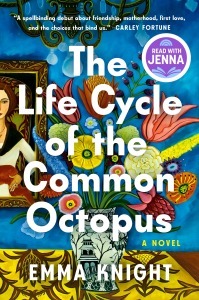The Life Cycle of the Common Octopus, by Emma Knight

First of all: this book is not about octopuses. There is zero octopus content in this novel; you are not going to meet a sentient, wise octopus character like in Remarkably Bright Creatures. The octopus is a metaphor, and one that is mentioned fairly let in the novel, though it’s very apt for at least one of the novel’s major themes. Given the sudden surge in octopus popularity in fiction and popular culture at the moment, it’s tempting to suspect that someone at the publishing house leapt upon that metaphor as a great and very saleable title idea, but this novel is strong enough that it doesn’t need to reach out a tentacle to lure in octo-curious readers only to disappoint them: it should stand on its own merits as a very human coming-of-age story that explores themes of family and identity.
The man character, Pen, is a Canadian girl who, along with her best friend Alice, leaves Toronto to attend the University of Edinburgh (as the author herself did) in 2006. Both girls are inspired to leave the country for university by a desire for adventure away from home, but Pen has another motive: there’s a famous Scottish author (who is also a lord, and lives in a vast manor house) who was her father’s best friend when he, too, lived in Britain in his youth. Her father has been cagey about this friend and why they’re more or less estranged now, and Pen, raised amid the wreckage of her parents’ unhappy marriage and eventual divorce, believes that if she can meet this old friend of her father’s, she can perhaps uncover some secret that might help her understand her family better.
Well, she does uncover secrets — while at the same time meeting new people, falling in love, testing the strength of friendships, making dumb mistakes, re-inventing herself, and examining her family in a new light — in other words, doing all the things you’re supposed to do in the first year of university, especially if you’ve moved far from home to go there. I thoroughly enjoyed these characters and this journey through Pen’s first year in Edinburgh, with all the discoveries, both external and internal, that she makes. I also really enjoyed the time-setting of 2006 — that era of non-smart phones, character-limited texting, and instant-messaging chats on a desktop computer: when instant communication was possible but so much less immediate and pervasive than it is today; perhaps the very last moment when it was possible for people to be truly unplugged. It was nice revisiting that moment, as well as that time in life (much earlier than 2006 for me, and in a very different setting, but with many of the same emotions) when you’re 18, far from home, making new friends and trying to figure out who you were. I loved everything about this book.



